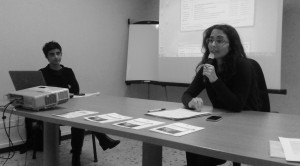Grundtvig second meeting: workshop on family reunification process
 On Thursday 27 March 2014, within the framework of the Grundtivg project “Advanced Training Programme on Transnational Families Support”, Soleterre Onlus organized a workshop on family reunification process at the municipality of Milan.
On Thursday 27 March 2014, within the framework of the Grundtivg project “Advanced Training Programme on Transnational Families Support”, Soleterre Onlus organized a workshop on family reunification process at the municipality of Milan.
The reunification process has multiple aspects to be considered, especially it affects the well-being of the minor who first experiences separation from the parent and later suffers a rooting out from his/her environment. In this workshop we focused on the reunification process in Milan analyzing the role of local authorities and the network of associations, giving a support to the migrant family.
Susanna Sucato, social assistant of the municipality of Milan, explained how the Municipality intervenes in the process of family reunification and which services it offers. In Milan 16% the population is migrant –meanwhile the Italian average is 6% – and it is also the city with the largest number of reunification requests. The institution appointed to manage the reunification process is the Sportello Unico per l’immigrazione of the Ministry of the Home affairs, which is present in every prefecture. The municipality of Milan operates on three different levels to support the migrant in this delicate phase: preparation, arrival and strengthening. From July 2013 is available a new service: RaggiungiMI (JoinMe). In collaboration with the prefectures, they monitor the arrivals and offer a support to the migrant in different fields: legal, educative and psychological.
The municipality of Milan undertakes other activities to enhance the role of the migrant in the society. Caterina Sarfatti, from the international affairs department, reported the positive results obtained with the co-development programme Milan for Co-development, implemented with the support Fondazione Cariplo and strictly related to the topic of EXPO 2015: biodiversity, food security and development. In the final phase of this experience emerged the idea to extend co-development in every sector of the social welfare.
The organizations of the third sector gave their contributions to the topic , illustrating their activities in support of the migrant families. First Roberto Bestazza from Terrenuove association, explained how they implement a psychosocial approach to face the trauma of separation, fostering resilience process. The association Comin organizes training for migrant people to manage their sons and daughters integration without charging them with too many expectations as Anna Monti, a professional educator, pointed out. Giorgia Gallotta presented the work of the Centro Paolo Del Bue, an association commited in the support of migrant pupils school integration from 1985. They follow the children since their arrival with an initial informative interview till the research of the school and school enrollment. Finally Valentina Bugli presented Codici association activities with the second generation. They involve migrant children in consultation groups helping them to find communication tools to externalize their experience. The participatory approach gives positive results although is not supported by an active inclusion of the migrant through state policy.
Polish Migration Forum and ALC explained the legal framework of the reunification process in Poland and in France. Comparing them with the Italian law on reunification process, it is possible to underline some similarities: they are addressed only to the spouses – legally married – minor sons and daughter, moreover they require some criteria regarding employment, housing, income and residence in the country. It is a process that requires long time and it is also quite expensive for the migrant to undertake it.
Finally Fondazione L’Albero della Vita presented a project on the reunification process implemented with the Municipality of Venice and Novimedia cooperative addressed to eastern European families. The aim of the project is to foster the integration of youth and families in the hosting society and to reflect on distant parenthood.
Alternative Sociale and Partners Bulgaria Foundation presented another aspect of migration: children left behind by migrant parents. The consequences of migration on these children are particularly harsh, minors growing up without parental care are considered a vulnerable group. Studies, NGO’s researches and their everyday work, prove that these children could suffer behavioral problems and deviation and often they show signs of neglect in health assistance and food habits.
In conclusion it is possible to affirm that, although exists a solid network of associations carrying on an excellent work in sustaining the migrant families, local authorities and third sector should enhance their cooperation to improve the efficiency of their action.

